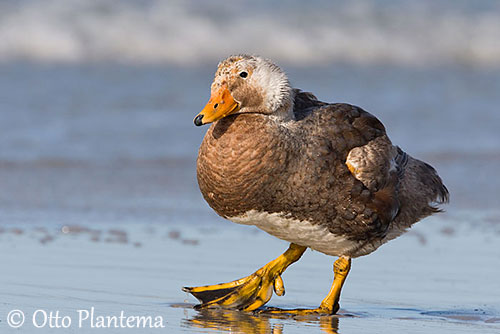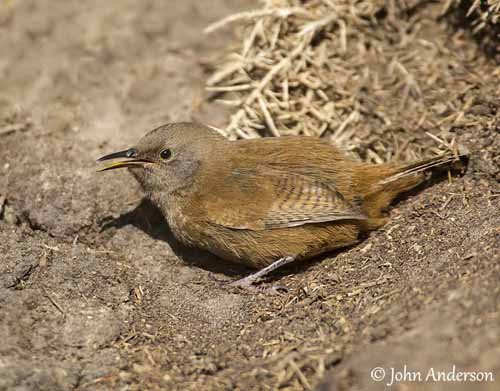

Resident and/or breeding species or passing through the islands:
Ashy-headed Goose - Chloephaga poliocephala - Ouette à tête grise
Austral Thrush - Turdus falcklandii - Merle austral
Baird’s Sandpiper - Calidris bairdii - Bécasseau de Baird
Barn Owl – Tyto alba – Effraie des clochers
Barn Swallow - Hirundo rustica - Hirondelle rustique
Black-browed Albatross - Thalassarche melanophris - Albatros à sourcils noirs
Black-chinned Siskin - Carduelis barbata – Chardonneret à menton noir
Blackish Cinclodes - Cinclodes antarcticus - Cinclode fuligineux
Black-crowned Night Heron – Nycticorax nycticorax – Bihoreau gris
Black-necked Swan - Cygnus melanocoryphus - Cygne à cou noir
Blackish Oystercatcher – Haematopus ater - Huitrier noir
Brown-hooded Gull - Chroicocephalus maculipennis - Mouette de Patagonie
Brown Skua – Stercorarius antarcticus - Labbe antarctique
Buller’s Albatross - Thalassarche bulleri - Albatros de Buller
Chiloe Wigeon - Anas sibilatrix - Canard de Chiloé
Cinnamon Teal - Anas cyanoptera - Sarcelle cannelle
Correndera Pipit - Anthus correndera - Pipit correndera
Coscoroba Swan – Coscoroba coscoroba - Coscoroba blanc
Crested Duck - Lophonetta specularioides - Canard huppé
Dark-faced Ground-Tyrant - Muscisaxicola maclovianus - Dormilon bistré
Dolphin Gull – Leucophaeus scoresbii - Goéland de Scoresby
Gentoo Penguin - Pygoscelis papua - Manchot papou
Great Grebe - Podiceps major - Grand grèbe
Grey-headed Albatross – Thalassarche chrysostoma – Albatros à tête grise
House Sparrow - Passer domesticus - Moineau domestique
Kelp Goose - Chloephaga hybrida - Ouette marine
Kelp Gull - Larus dominicanus – Goéland dominicain
Imperial Shag - Leucocarbo atriceps - Cormoran impérial
King Penguin - Aptenodytes patagonicus - Manchot Royal
Light-mantled Albatross - Phoebetria palpebrata - Albatros fuligineux
Long-tailed Jaeger - Stercorarius longicaudus - Labbe à longue queue
Long-tailed Meadowlark -Sturnella loyca - Sturnelle australe
Macaroni Penguin – Eudyptes chrysolophus – Gorfou doré
Rock Shag or Magellanic Cormorant – Phalacrocorax magellanicus – Cormoran de Magellan
Magellanic Oystercatcher - Haematopus leucopodus - Huîtrier de Garnot
Magellanic Penguin - Spheniscus magellanicus - Manchot de Magellan
Magellanic Snipe - Gallinago magellanica - Bécassine de Magellan
Maguari Stork - Ciconia maguari - Cigogne maguari
Northern Giant-Petrel – Macronectes halli – Pétrel de Hall
Peregrine Falcon - Falco peregrinus - Faucon pèlerin
Ruddy-headed Goose - Chloephaga rubidiceps – Ouette à tête rousse
Rufous-chested Plover - Charadrius modestus – Gravelot d’Urville
Sanderling – Calidris alba - Bécasseau sanderling
Sedge Wren or Grass Wren - Cistothorus platensis - Troglodyte à bec court
Short-eared Owl - Asio flammeus sanfordi - Hibou des marais
Silver Teal - Anas versicolor - Sarcelle bariolée
Silvery Grebe - Podiceps occipitalis - Grèbe aux belles joues
Snowy Sheathbill - Chionis alba - Chionis blanc
South-American Tern - Sterna hirundinacea - Sterne hirundinacée
Southern Crested Caracara - Caracara plancus – Caracara huppé
Southern Giant Petrel - Macronectes giganteus - Pétrel géant
Southern Rockhopper Penguin - Eudyptes chrysocome - Gorfou sauteur
Striated Caracara - Phalcoboenus australis - Caracara austral
Turkey Vulture - Cathartes aura - Urubu à tête rouge
Two-banded Plover - Charadrius falklandicus - Pluvier ou Gravelot des Falkland
Upland Goose - Chloephaga picta - Ouette de Magellan
Variable Hawk - Geranoaetus polyosoma – Buse tricolore
Wandering Albatross - Diomedea exulans - Albatros hurleur
Western Cattle Egret - Bubulcus ibis - Héron garde-bœufs
White-bridled Finch - Melanodera melanodera - Mélanodère à sourcils blancs
White-chinned Petrel - Procellaria aequinoctialis - Puffin à menton blanc
White-tufted Grebe - Rollandia rolland - Grèbe de Rolland
Yellow-billed Pintail - Anas georgica - Canard à queue pointue
Yellow-billed Teal - Anas flavirostris – Sarcelle tachetée
Introduced species:
Greylag Goose - Anser anser - Oie cendrée
House Sparrow - Passer domesticus - Moineau domestique
Mallard – Anas platyrhynchos – Canard colvert
Sources:
A Complete Guide to Antarctic Wildlife by Hadoram Shirihai and Illustrated by Brett Jarrett - Edited by Guy M. Kirwan - ALUL.A Press Oy, Finland - ISBN 9519894705
Birds & Seals of the Falkland Islands
Wikipedia, the free encyclopaedia
BirdLife International (BirdLife International)
FALKLAND ISLANDS
ENDEMIC BIRD SPECIES
Falkland Islands is an archipelago located off South America in the South Atlantic Ocean on the Patagonian Shelf, at about 480 km from Argentina’s coasts, and 940 km from N Antarctica. East Falkland and West Falkland are the main islands, but there are more than 700 smaller islands too. They are included in the “mild” Antarctic Zone.
Several habitat types can be found with varied soils, from coastal areas, through grassy or shrubby lowlands, to hills and mountains. The climate is usually cold, windy and humid, with regular rainfall. Cloudy sky is common.
Naturally treeless grounds, the Falklands are partially covered with wind-resistant vegetation.
The wildlife is very similar to that of Patagonia. Large numbers of birds, about 227 species, can be seen around the islands, and numerous species, over 60 ones, breed on the small islands.
The resident species include 21 land birds and 18 water birds, and we can add 22 seabird species which breed on the islands. Finally, 63 species breed on the islands. But the unique endemic bird is the Falkland Island Steamer Duck (Tachyeres brachypterus) and maybe a second one, the Cobb's Wren.
Introduced cats, rats, foxes and other predators have a negative impact on birds nesting on the ground. House Sparrows and domestic geese are the only introduced bird species.
Falklands endemic species:
Cobb’s Wren - Troglodytes cobbi – Troglodyte de Cobb
Falkland Steamerduck - Tachyeres brachypterus - Brassemer des Malouines
